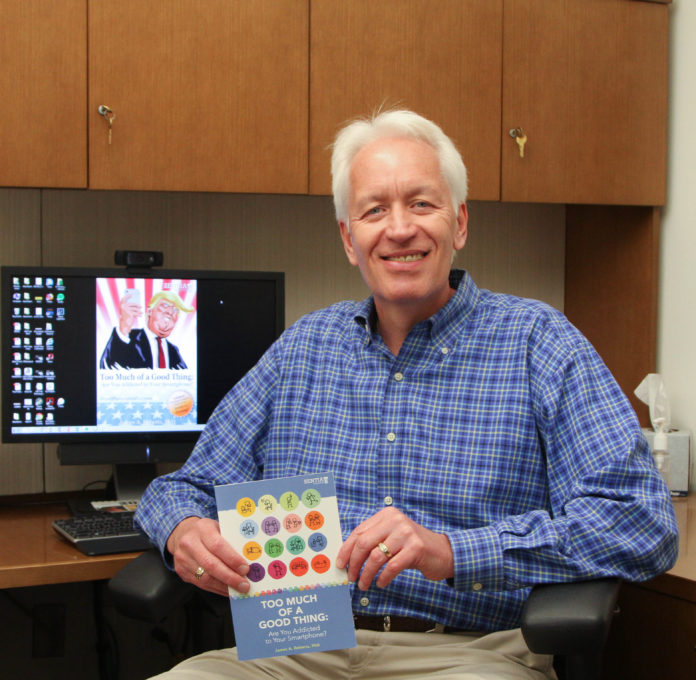
By Corrie Coleman | Staff Writer
Baylor marketing professors Jim Roberts and Meredith David have conducted extensive research on the consequences of cell phone addiction, concluding that excessive cell phone use can be incredibly harmful to relationships.
According to their research, Baylor students spend an average of nine hours on their cell phone each day. Roberts and David also said 60 percent of U.S. college students admit they may be addicted to their phone. In Roberts’ book “Too Much of a Good Thing,” he explores the negative effects cell phone addiction can have on relationships as well as mental and physical health.
“It doesn’t matter where you are, if you look around so many people are on their phones,” David said. “And a lot of times they aren’t even communicating with each other. They’re just interacting with their phones.”
Roberts believes that face-to-face interaction with others is the key to a happy life. He said that when people look to social media or texting for social interaction, their connections with others are weaker.
“You’re just getting words and so you’ll miss out on the ability to bond and understand what someone’s saying. You don’t see their body language, you don’t get the tone of voice, you don’t get to see their facial expressions. We build bonds with people through eye contact,” Roberts said. “I am convinced that more face-to-face conversations with our friends, our teachers, our families, will make us happier.”
Roberts coined the term “phubbing,” a combination of “phone” and “snubbing.” Phubbing occurs when someone is distracted by their phone and ignores another person.
“People don’t like to get phubbed,” Roberts said. “If you’re talking to your boyfriend, girlfriend, husband or wife, and they’re half paying attention … that hurts our feelings. It’s social rejection and that’s painful. None of us like to be ignored.”
In romantic relationships, Roberts said that phubbing can lead to higher levels of conflict and dissatisfaction.
“When you’re phubbed by your partner, that creates conflict. That conflict, whether it’s spoken or not spoken, leads to lower levels of reported relationship satisfaction,” Roberts said. “When we’re unhappy in our love relationships, we also report higher levels of stress, anxiety and depression.”
Roberts said attention and awareness of one’s partner is essential to healthy relationships.
“That’s the cornerstone of great relationships: people paying attention,” Roberts said. “That’s why phones are so disruptive to relationships because we’re not giving you the attention that you deserve.”
David said even having cell phones on the table while in a conversation can be harmful.
“When we eat dinner with a significant other or family members and we’re not fully present, we’re not engaging with people in conversation like we should be,” David said. “Just by keeping our phones on the table, we’re sending the message that the friend or loved one that, ‘What’s on my phone is more important than my conversation with you.’”
Cell phone addiction is widespread, Roberts said. Yet because of today’s technology-centered society, many may not know they are addicted.
“Sometimes, people might not even know they’re addicted. It’s just how people live their life now, tied to their phone,” Roberts said. “They don’t know that they don’t have a lot of friends they can depend on. Or they don’t realize that their bad performance in school is because they’re not focusing. They may not realize that their aches and pains come from sitting for hours scrolling on social media when they could be exercising outdoors.”
Roberts encourages everyone to look for ways their phone could be impacting their lives.
“Everyone needs to take a careful assessment of where their phone is integrated into their lives and make adjustments where they feel that it’s having a negative influence,” Roberts said.
David believes that, by becoming more aware of their cell phone use, students can take the correct steps toward healthy habits.
“We need to be cognizant of how attendant we are to our phones,” David said. “We should start trying to think, do we feel the urge to be checking our phone constantly? Do we have to keep our phone in sight at all times? If it rings or beeps, do I feel that I have to check it or look at it at that moment?”
Roberts says addiction can be conquered. He urges people to stop using their phone in the car, even if that means putting it in the trunk or turning it on airplane mode. Roberts also suggests putting phones away when spending time with friends and making rules about how often to check social media.
“Show that you can survive without your smartphone,” Roberts said. “It’s a hard habit to break but once you see that you can do it with those baby steps, you’ll be surprised. You’ll start to say, ‘Hey, a little more of the power rests with me now rather than my phone.’”





